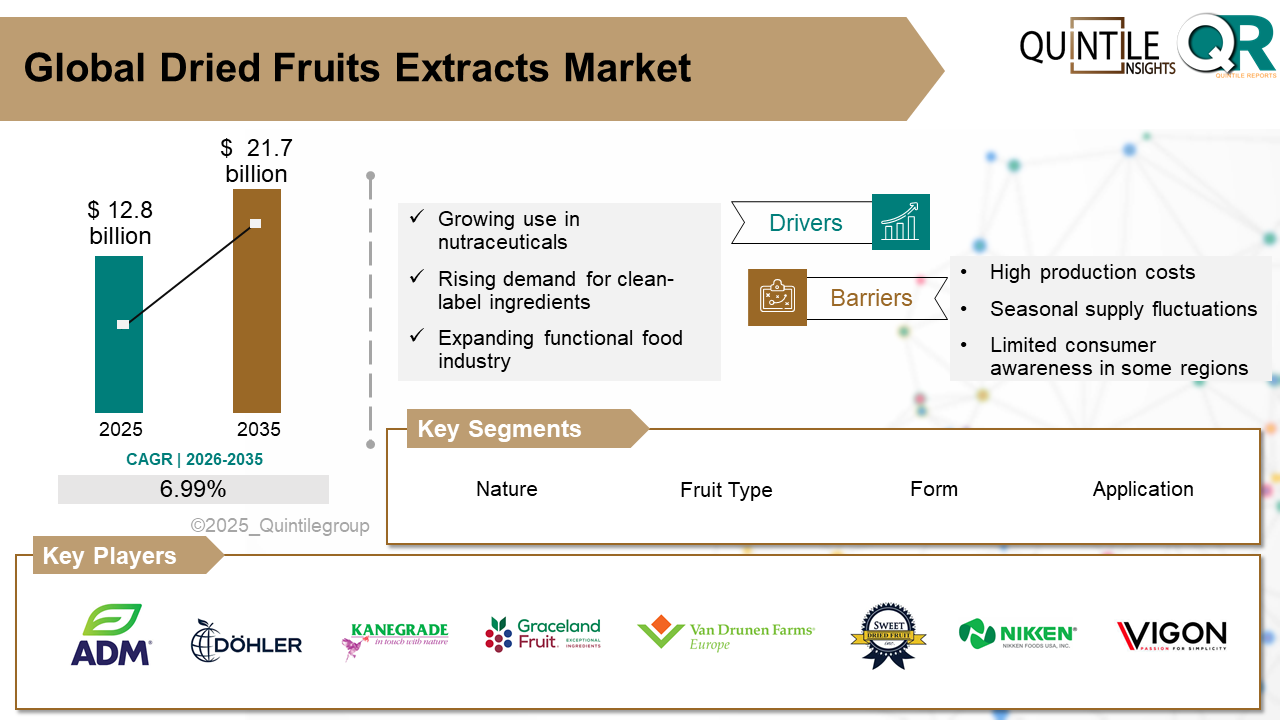Press Release
India | January 2026 – Quintile Reports has published a new market intelligence study on the global dried fruits extracts market is entering a decisive growth phase as clean-label reformulation, functional nutrition, and plant-based innovation reshape the food, beverage, and nutraceutical industries worldwide. According to a newly released study by Quintile Reports, the market was valued at USD 12.8 billion in 2025 and is projected to reach USD 21.7 billion by 2035, expanding at a robust CAGR of 6.99% during 2026–2035.
This sustained expansion highlights the accelerating shift away from synthetic additives toward natural, fruit-derived ingredients that deliver sweetness, flavor, color, and functional health benefits in a single solution.
Key Market Highlights (IMP Analysis)
- Market Size 2025: USD 12.8 Billion
- Projected Market Size 2035: USD 21.7 Billion
- Forecast CAGR (2026–2035): 6.99%
- Base Year: 2025
- Study Period: 2017–2035
These figures underscore dried fruit extracts’ growing role as multi-functional, clean-label ingredients across food, beverage, supplement, and pharmaceutical applications.
Key Growth Drivers Fueling the Market
- Over 60% of global consumers prefer products with natural and recognizable ingredients.
- Functional foods and beverages are growing at an estimated 8–10% CAGR globally.
- Plant-based and vegan food launches have increased by more than 50% in the last five years.
- Dried fruit extracts preserve up to 90–95% of antioxidant activity using advanced drying technologies.
- Rising adoption in nutraceuticals and dietary supplements due to high polyphenol concentration and improved palatability.
Market Challenges and Restraining Factors
- Raw material price volatility of 20–40% annually due to climate and geopolitical factors.
- 30–50% nutrient loss risk from improper drying techniques.
- Regulatory fragmentation across food, supplement, and pharmaceutical sectors.
Regional Market Trends
North America
A mature and innovation-driven market with strong adoption in functional beverages, sports nutrition, and dietary supplements, particularly in the United States.
Europe
Growth supported by strict clean-label regulations and high demand for organic and sustainably sourced extracts, led by Germany and France.
Asia Pacific
The fastest-growing region, driven by traditional medicine integration and rising functional food consumption in China and India.
Latin America
Increasing use of native fruit extracts for export markets, with Brazil and Mexico benefiting from biodiversity and cost-efficient sourcing.
Middle East & Africa
Gradual growth driven by urbanization and renewed interest in fruit- and herbal-based nutrition, especially in Gulf countries.
Competitive Landscape
The dried fruits extracts market is moderately fragmented, with competition focused on extraction efficiency, nutrient retention, application versatility, and supply chain integration.
Key players operating in the market include:
- Archer Daniels Midland (ADM)
- Döhler Group
- Van Drunen Farms
- Graceland Fruit
- Kanegrade
- Plant Lipids
- Vigon International
- Ingredients Online
- Wego Chemical Group
Recent Industry Development
March 2024: Brothers All Natural launched infused freeze-dried fruit crisps delivering the nutritional equivalent of two cups of fresh fruit per serving with only 90 calories, reinforcing demand for additive-free, non-GMO, plant-based fruit ingredients.
Market Outlook Through 2035
The market is expected to maintain strong momentum through 2035, supported by continuous R&D investments, strategic partnerships, mergers and acquisitions, and growing consumer demand for clean-label and functional products.
About the Report
The Dried Fruits Extracts Market Size Estimation, Share & Future Growth Trends Analysis (2026–2035) by Quintile Reports provides in-depth insights across nature, fruit type, form, application, distribution channel, and regional markets, supported by qualitative and quantitative analysis from 2017 to 2035.
Request a free PDF sample or customization:
Email: sales@quintilereports.com
© 2026 Quintile Reports. All Rights Reserved.
Our Lates Press Release
Clean Label Emulsifiers Market 2026: Trends, Drivers, and Growth Opportunities
